[ad_1]
“Love is not a sin.” These are words that Sitara, Swara Bhasker’s character in Sheer Qorma, wanted to hear from her late mother after coming out. But she never did. This, and similar affecting elements of the queer experience, formed the underpinnings of the 8th edition of the Out and Loud Pune Queer International Film Festival, which saw the screening of more than 40 films and three panel discussions from May 24 to 26.
In a tent adorned with cheery Pride flags on the campus of Max Mueller Bhavan/Goethe Institut, Pune, people gathered to watch films creatively reimagining painful or touching lived realities, and documentaries capturing powerful moments, centred around the queer community.
Taking place shortly before Pride month (which is celebrated in June every year), the festival offered up assorted perspectives on queer lives, with feature films, shorts, documentaries and experimental narratives from across India and the globe. It was organised by MIST LGBTQ foundation, with IBM as a title sponsor.
Creating narratives
The closing film and arguably one of the biggest draws of the festival was Sheer Qorma, directed by Faraz Asif Ansari. Soft, poignant and rich in detail, the film traces the story of Saira, a non-binary individual played by Divya Dutta, and their relationship with their mother (Shabana Azmi), strained further by the presence of Saira’s wife, Sitara (Swara Bhasker).
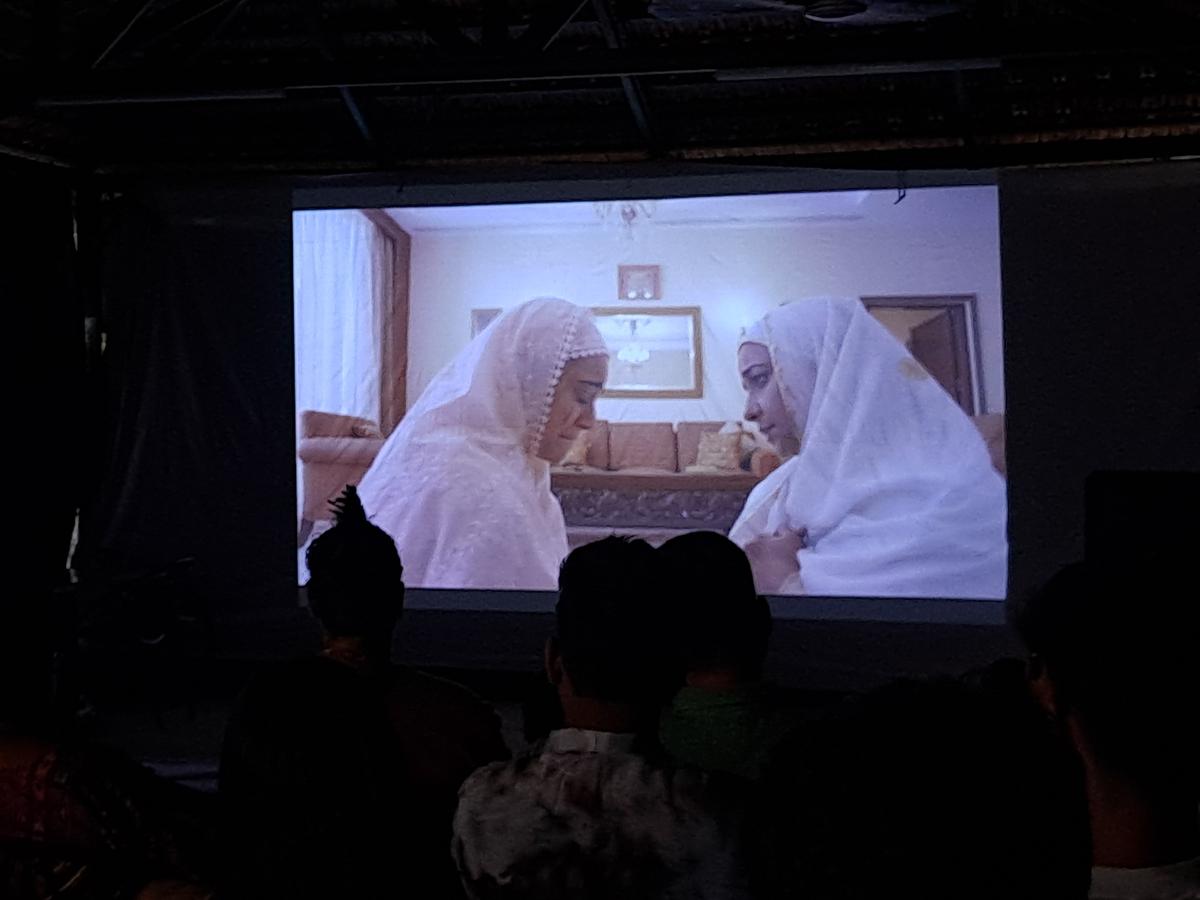
A still from Sheer Qorma with Swara Bhasker and Divya Dutta at the Out and Loud Pune International Queer Film Festival held from May 24-26 at Max Mueller Bhavan Pune
| Photo Credit:
Sruthi Darbhamullla
Saira has been estranged from their mother for several years. On Eid, they decide to return home for the first time in 15 years with their wife. Right at the start we see the clear difference in the treatment of Sitara and Susan, Saira’s brother’s partner. Frustrated with the fact that no amount of time was enough to bring their mother around to their lived reality, Saira leaves the meal in a huff. Sitara, meanwhile, has lost her mother soon after coming out to her, and only longs to hear the words — mohabbat gunah nahi hain (love is not a sin). How Saira’s mother comes around to acceptance, not merely tolerance, through the subtle and sensitive insight of one in their household, forms the rest of the story.
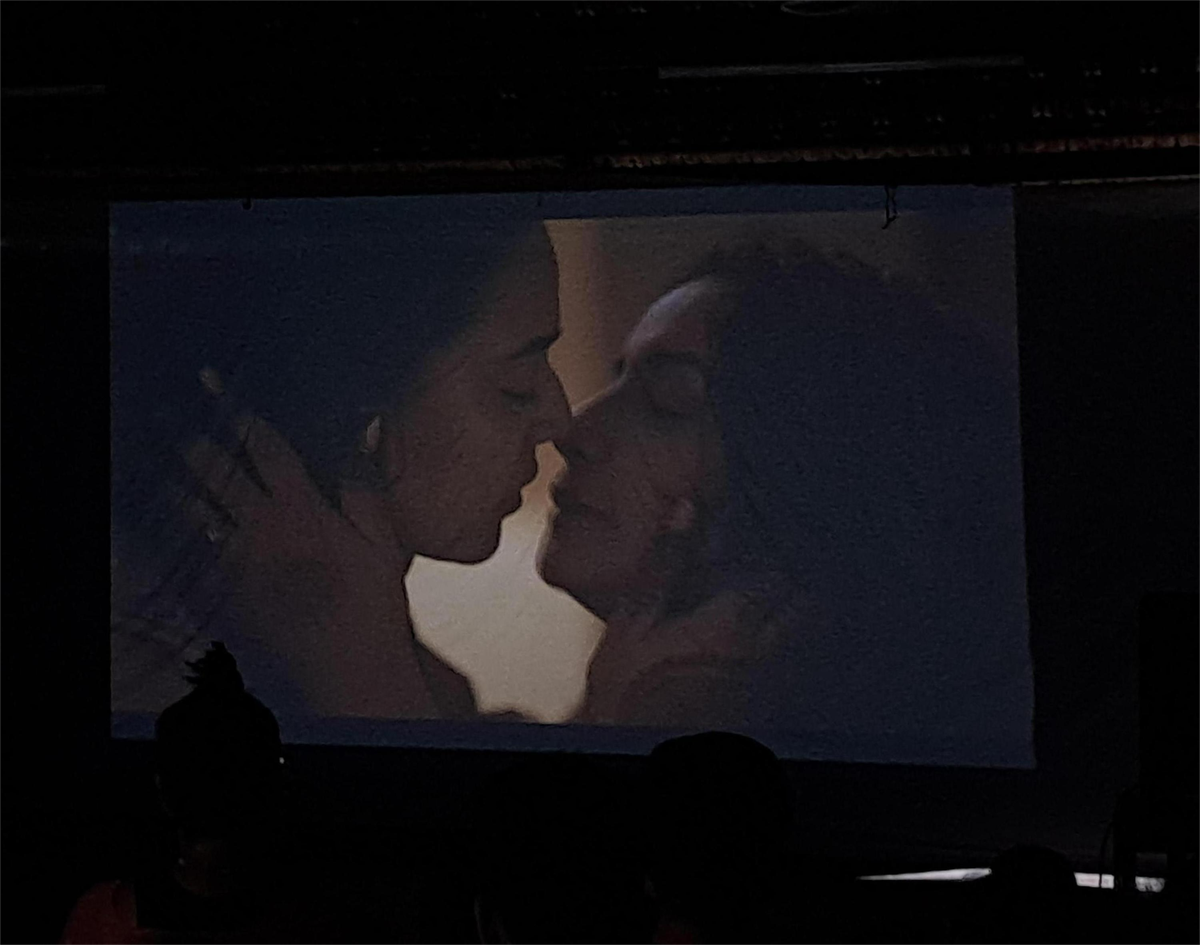
A still from Sheer Qorma with Swara Bhasker and Divya Dutta at the Out and Loud Pune International Queer Film Festival held from May 24-26 at Max Mueller Bhavan Pune
| Photo Credit:
Sruthi Darbhamullla
The film received critical claim when it was released in 2021, garnering several accolades and qualifying for the BAFTA Awards. This, however, was the film’s first screening in Pune. In a speech after the movie, Faraz pointed out that there is no support for independent filmmakers, especially those working with queer narratives. It took so long to bring it here because it was difficult to find collaborators. “No one wanted to fund it,” they share.
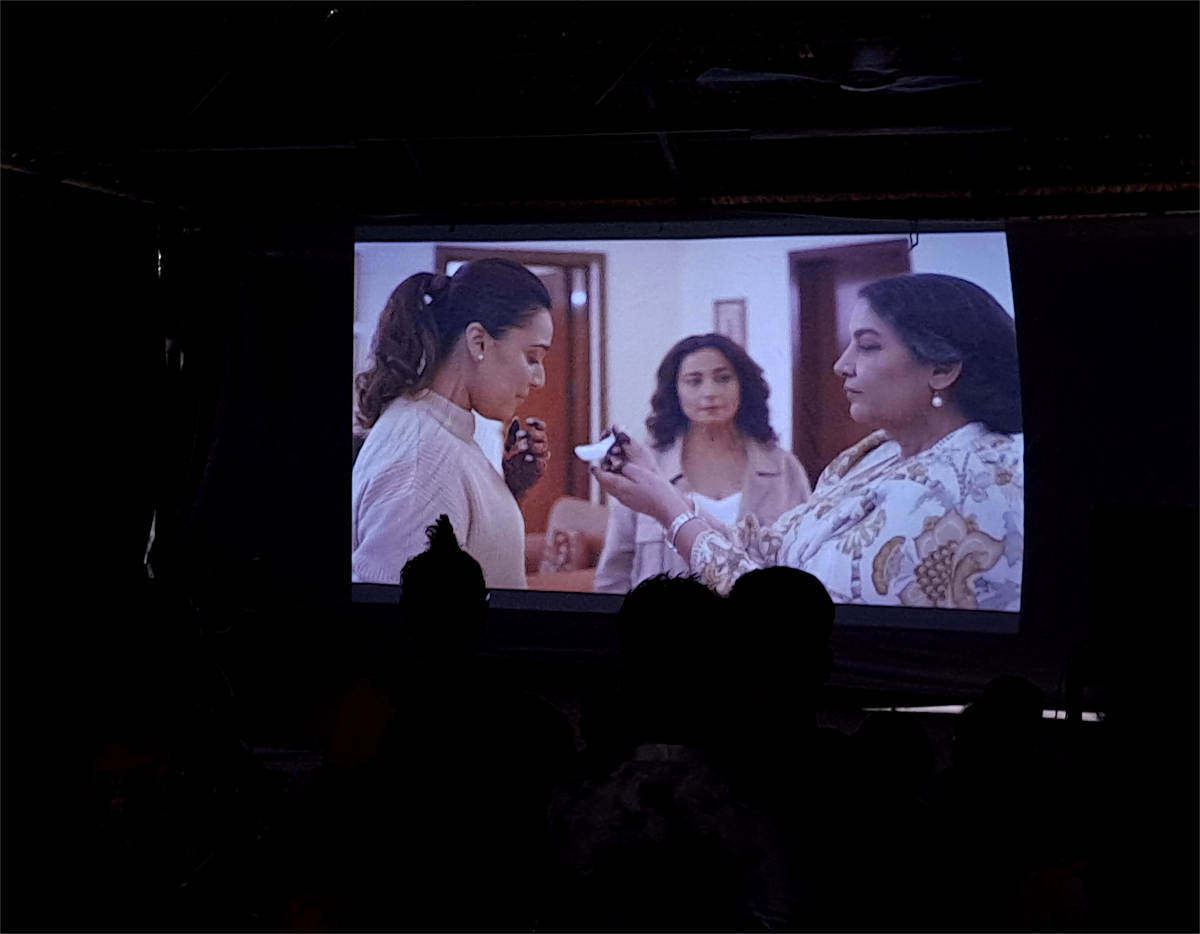
A still from Sheer Qorma with Swara Bhasker, Divya Dutta and Shabana Azmi and at the Out and Loud Pune International Queer Film Festival held from May 24-26 at Max Mueller Bhavan Pune
| Photo Credit:
Sruthi Darbhamullla
Sheer Qorma happened after Faraz was asked by a queer audience member at a college screening why they always saw men in Indian queer narratives, not women. The idea for the film originated then, with the filmmaker soon sketching out a pivotal scene where the two leads, garbed in headscarves, bend their heads together — on a napkin. “I wanted to show that the mainstream can be feminine, sublime, and sensitive,” they share, adding that they also sought an authentic portrayal of both Muslim and queer identities.
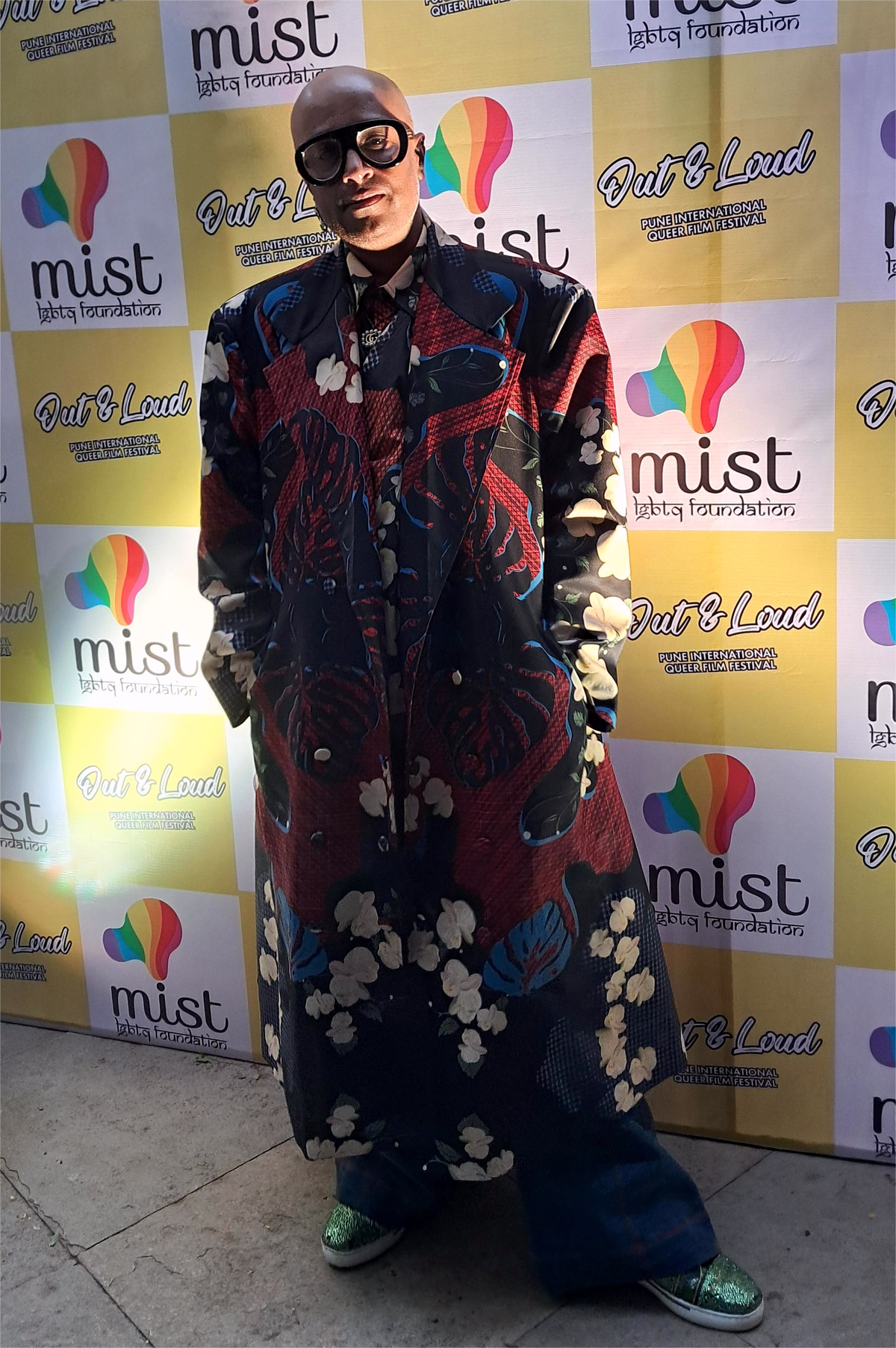
Faraz Asif Ansari, director of Sheer Qorma, at the Out and Loud Pune International Queer Film Festival held from May 24-26 at Max Mueller Bhavan Pune
| Photo Credit:
Sruthi Darbhamullla
Next up for the filmmaker is Bun Tikki, a mainstream film about gender identities. It features a stellar cast in Abhay Deol, Shabana Azmi and Zeenat Aman (Aman and Azmi share the screen after three decades) And after that? A film about motherhood, perhaps— about a mother-daughter relationship.

There was no dearth of other thoughtful features in the festival. Valentine @3, directed by Mani Shankar Iyer, follows three stories related to gay identity, set in Chennai — a mother consoling her gay son who has been rejected by his crush and unwittingly outed to his college, a gay couple meeting in secret on a Chennai beach and discussing the future of their relationship, and a taxi driver consoling a gay man who faces a break-up in the back seat of his taxi, who also has his own painful story. The film was awarded Best Indian Narrative Feature Film as well as Best of Out and Loud PIQFF 2024.
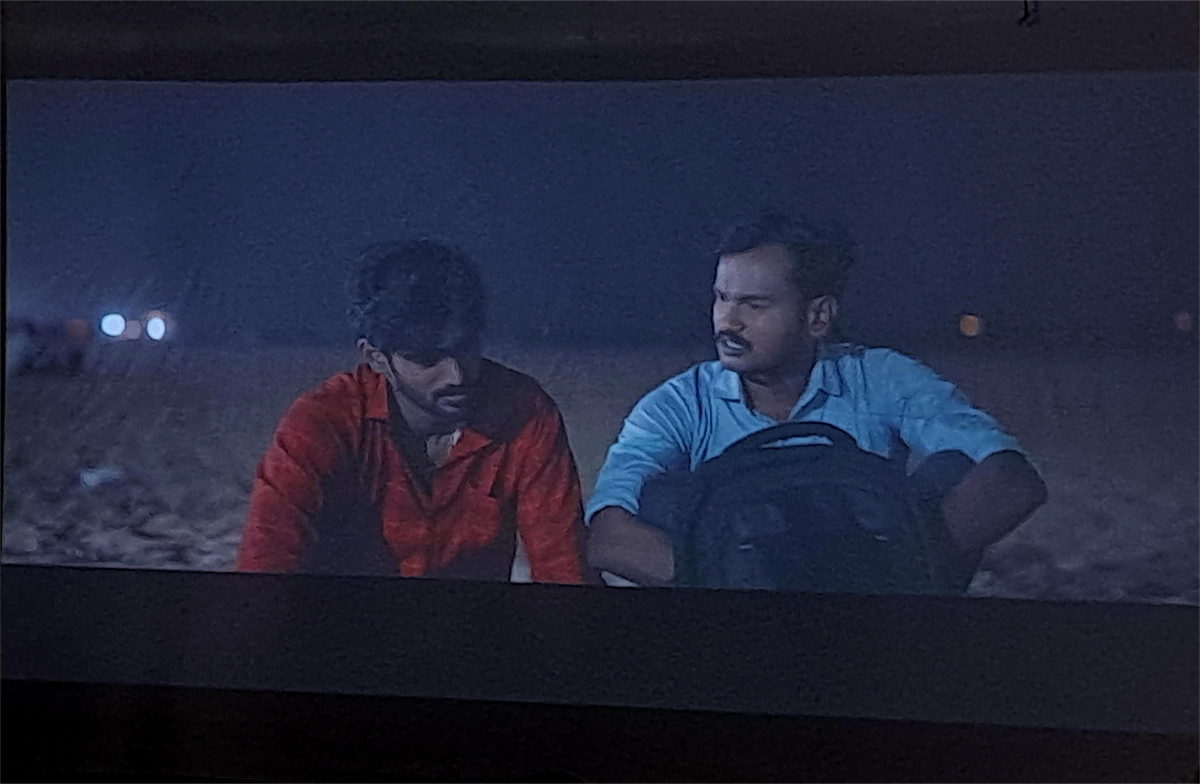
A still from Valentine@3 at the Out and Loud Pune International Queer Film Festival held from May 24-26 at Max Mueller Bhavan Pune
| Photo Credit:
Sruthi Darbhamullla
An international feature, Muriel and Joyce Get A Boat, tells a tale of friendship as much as the memories of a lost queer love that cannot be rekindled again.
Snippets of stories
Numerous fresh little short stories were available for the audience’s delectation as well.
Love+ features a gay couple dealing with what it means to be a sero-discordant couple — where one of the partners has an HIV-positive status. Utkarsh and Ajay are a couple living together. Ajay is preparing for an Instagram live interview with a podcaster about living with HIV, and trying to convince Utkarsh to join him. How Utkarsh becomes comfortable with publicly announcing that Ajay is his boyfriend forms the rest of the story, coupled with the difficulties associated with seeking acceptance, both from yourself and society.
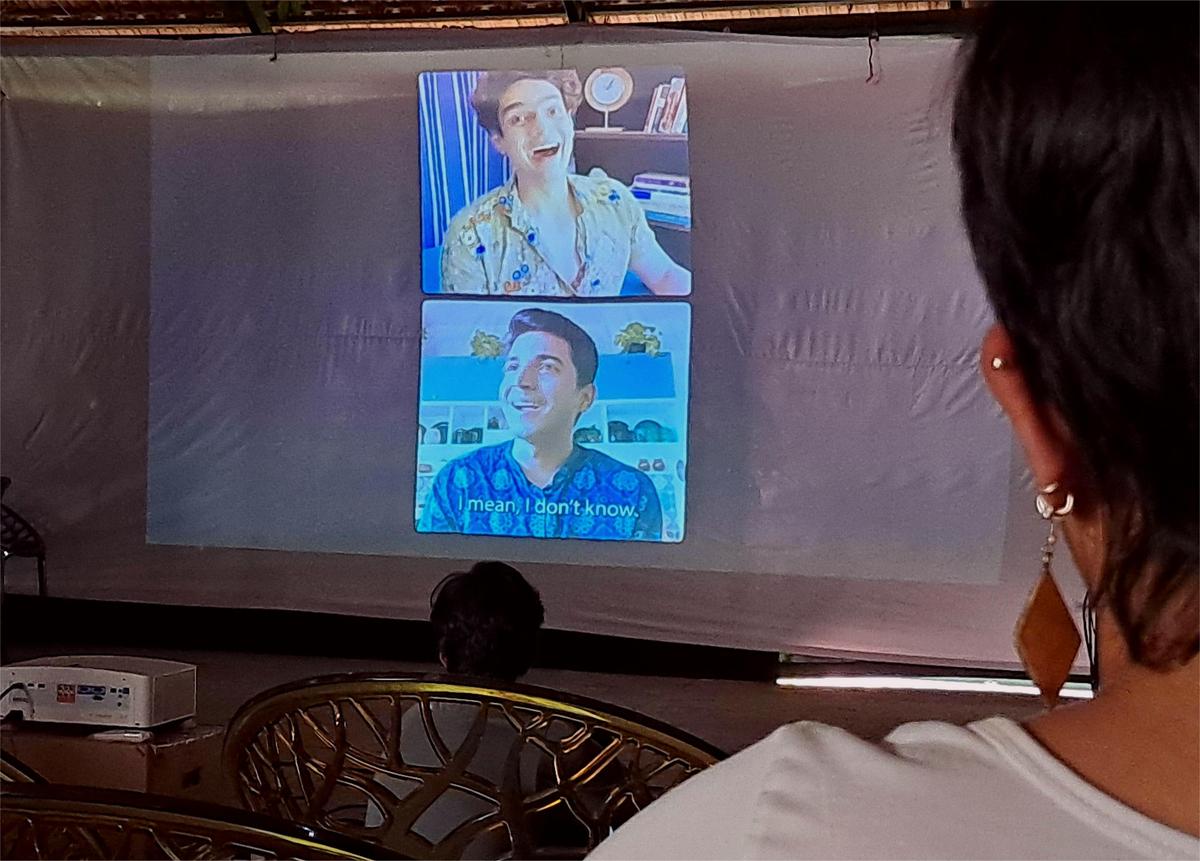
A still from Love+ at the Out and Loud Pune International Queer Film Festival held from May 24-26 at Max Mueller Bhavan Pune
| Photo Credit:
Sruthi Darbhamullla
The short, directed by Tushar Tyagi, won Best Indian Short Film (Narrative) at the festival.
In They/Them, by Phelian, a lonely teacher experiences gender dysphoria in their 50s. After looking up dating tips for older women and checking out a dating app, Shakuntala becomes curious about they/them pronouns and mulls over their own identity. Settling on they/them pronouns and calling themselves Sky, the lead character come into their own, in a narrative interwoven with flashbacks to the dissonance they felt as a student and a younger person.
The filmmaker Phelian shared that this was a graduation film, but later took “wings of its own” to become more than a student film and eventually be acquired.

Documenting reality
With fiction came fact.
Among the documentaries screened on Day 1 was Beyond Norms: Exploring Identity – Masc vs Masc, in which the creator Kelly Balch sets about a unique experiment— to test the boundaries of same-sex attraction by bringing in the element of ‘mascness’: the quality of approximating to masculinity. Eight people who usually do not date ‘masc’ people, including those who identify as lesbian, non-binary and trans, all gather in the filmmaker’s house to have an honest conversation and share a kiss. Riveting, bold and surprisingly tender, the documentary touches upon navigating identity in the world of queer dating.
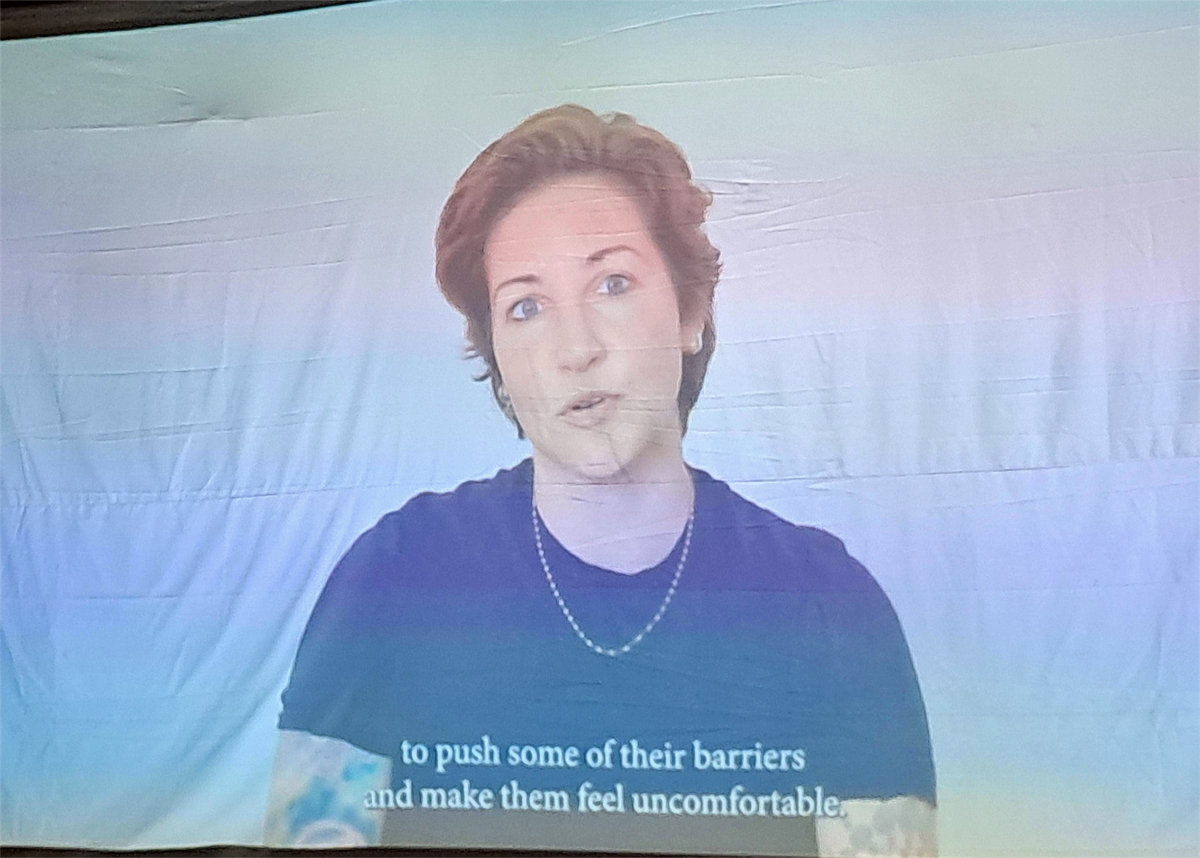
A still from Beyond Norms: Exploring Identity- Masc vs Masc at the Out and Loud Pune International Queer Film Festival held from May 24-26 at Max Mueller Bhavan Pune
| Photo Credit:
Sruthi Darbhamullla
The documentary won Best International Documentary at the festival.
Maghreb’s Hope, by Bassen Ben Ibrahim, traces four queer individuals hailing from Maghreb— a region in North Africa chiefly comprised of Muslim majority nations. We hear the raw story of a gay man in Algeria, who was bullied in high school, with people calling him 106 (Algerian slang for an effeminate person). The discrimination has not stopped, even as an adult; he shares that in Algeria, LGBTQ people caught by the police are immediately charged with public immorality and indecency. It takes a toll as well; he shares that he lost his boyfriend to suicide.
From there, we hear from Ritaj, a bisexual gender fluid Tunisian living in Libya for the past six years. They were forced to leave Tunisia after they received online threats and phone calls from an armed militia called al-Rada. Ritaj started Libya’s first LGBTQ organisation, Kun, and is looking forward to continuing their work, potentially resettling in the US. The next tale is of a compatriot, a Tunisian transman now in Brazil. He too has a painful coming out story, forced to come out after his face was captured on TV during a protest. He has made his escape to Brazil and is seeking asylum there, under his new name Jade. Meanwhile, we also see a 19 year-old transwoman in Morocco figuring out how to balance her queer identity and her surroundings. The name she is born with is Khalil, but she wishes now to go by Afef.
There are Indian narratives too, though one of them is told by Romanian director Mariangela Mihai. In I am a whisper, my dear, produced by Ethnocine and the Mizo Gay Society, we see the lives of queer Mizo people living across India, caught between religion, cultural identity and their sexuality, in a feature laden with poetry, music, interpretative dance and metaphor-laden videography. Everything is shot in quasi-darkness, with dim lights in the night— reinforcing the feeling that we are viewing something secret, something precious, not lightly shared.

Teddy, in Mizoram, shares that he is called tuai (Mizo slang for a transperson or crossdresser) — “You’re not tuai, why are you gay?” his classmates would ask. He laments the pain of gay men who are only sons, expected to marry and bring home a wife to take care of their parents in their old age. A tomboy in her childhood, Sansangni from Aizawl shares that they thought only a tomboy and a feminine woman could be in love in Mizo society, and that she didn’t know that even feminine girls could date each other. She recounts harsh things she has heard people say about queer women in Mizo society. One casually-told tale seems exceptionally cruel — a woman was a tomboy, she was raped, and now is carrying a baby and breastfeeding; she thus cannot be a tomboy anymore.
We also see the keen pain of Rina, a gay man in Aizawl, who tried to commit suicide multiple times, torn between faith and sexuality. He still loves God; the difference between “Nothing matters if God is not there” and “Nothing matters if God is there” is life itself, he says. Indeed, the clash between religion and LGBTQ identity is a recurring theme here; another person shares that churchgoing feels like balancing on a knife’s edge— “you don’t know how it will cut you and how deep.”
Of belonging
In between narratives of love and longing, there are those that speak of belonging
Confluence: A Meditation in Documentary Form traces its path through the narratives of young Asian American musicians, with Vietnamese, Filipino, Korean, Chinese, Japanese and Indian roots, speaking about understanding their complex identity, and their equation with music. The aesthetically-compelling film is scored with trance-like music and moves through blurry colourful shots, which become progressively clearer till you can see the musicians as they perform on stage. Where do we belong? What is our community? Who are we? are questions that assail people who hold multiple identities, and the film tries to tackle that, albeit through the lens of AAPI identities more than expressly queer identities.
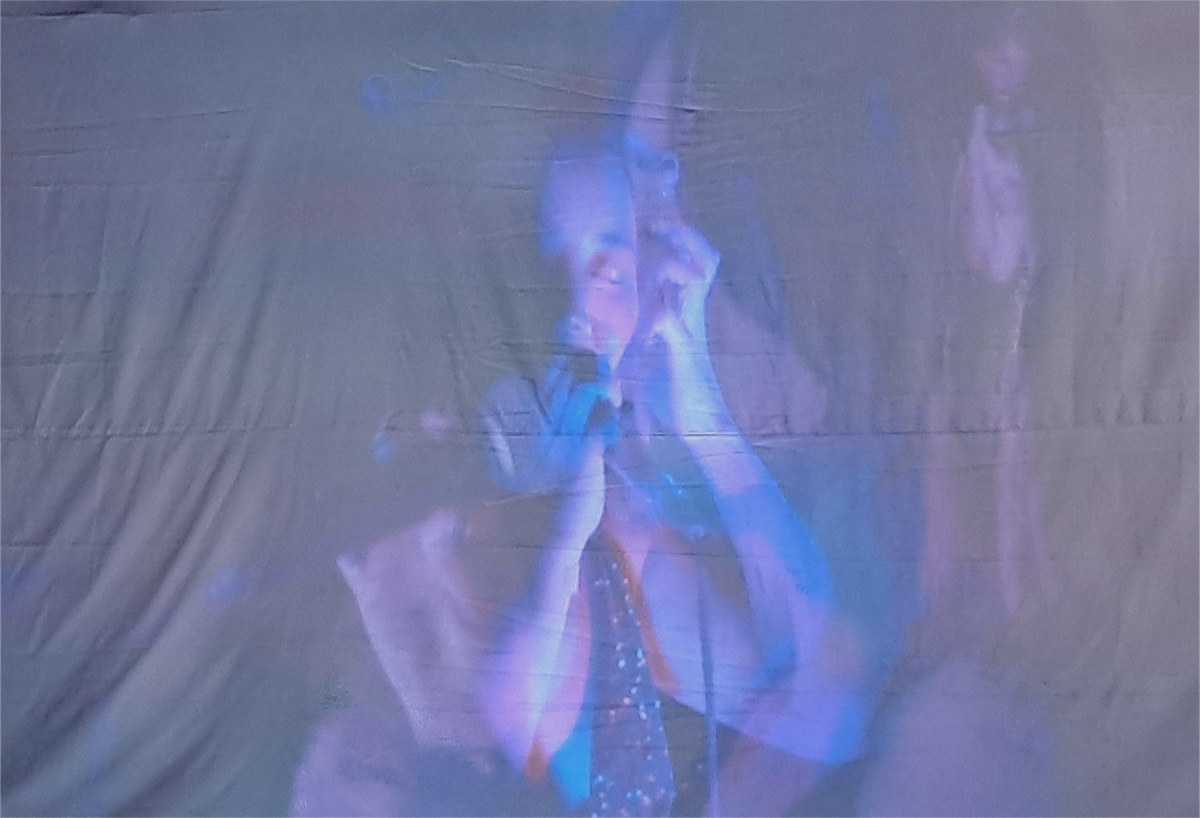
A still from Confluence at the Out and Loud Pune International Queer Film Festival held from May 24-26 at Max Mueller Bhavan Pune
| Photo Credit:
Sruthi Darbhamullla
There are other lingering questions about identity and belonging. In Hate, a Italian experimental short, we see a transwoman suffering from the love she has for the mother who doesn’t accept her identity. The sense of fragile emotions is further heightened by artistic shots of flowers held by the lead character. “Are you prepared to lose me?” she thinks, hoping for understanding from her mother.
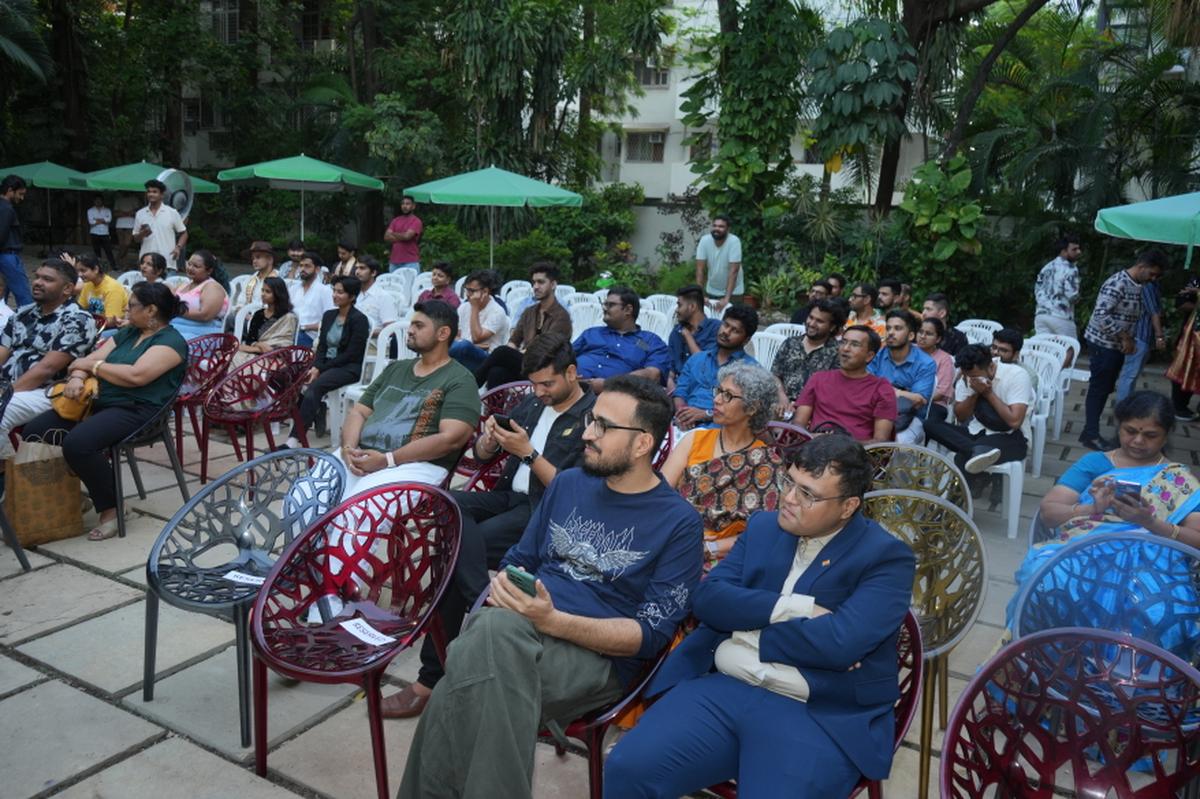
Participants attend a panel discussion at the Out and Loud Pune International Queer Film Festival held from May 24-26 at Max Mueller Bhavan Pune
#Pride #Month #glimpse #Loud #Pune #International #Queer #Film #Festival
[ad_2]
Source link


